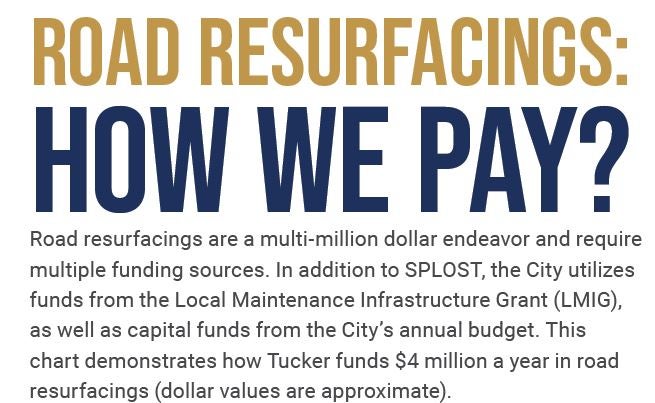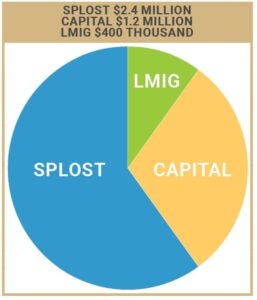InTucker Magazine
March 2022
Smoothing our Streets
Tucker Prepares To Embark Upon 2022 Resurfacing Campaign

Either this month or next – depending on whether Mother Nature is smiling on Tucker – the City will embark on its fifth annual road resurfacing campaign. Prior to 2018, the City did not repave any of its own streets; that responsibility fell to DeKalb County, unless it was a state route, then it was GDOT’s responsibility.
But the passage of the 2017 SPLOST referendum changed everything. The extra penny sales tax approved overwhelmingly by voters gave cities in DeKalb the opportunity and the resources to assess and resurface their own roads. The amount of money received by each municipality varies each year based on revenues and local population, but in Tucker it has consistently come in the $5-6 million range.

Not all of the money goes to road resurfacing. According to the terms of the referendum set out by the County, at least 20 percent of the funds must be spent on multi-modal transportation projects. That would include things like paths and sidewalks. Up to 15 percent can be spent on parks and public safety facilities. That leaves at least 65 percent to be allocated for roads and drainage.
Over the course of the past four years, Tucker has spent more than $20 million on road resurfacings, most of that amount coming from SPLOST funding. In the year ahead, they plan to spend around an additional $4 million to pave as many as 66 streets across the City. The streets selected were determined by data; the City hired the firm Stantec in 2018 and again in 2021 to drive every mile of public road within the city limits. Their hi-tech van was able to capture conditions on the road’s surface, as well as beneath the surface and report it back to Tucker City Engineer Ken Hildebrandt. The pavement condition index (PCI) scores were then ranked, giving the Mayor and City Council an easy way to determine road resurfacing priorities.
The difference made by these resurfacing projects has been unmistakable. Hundreds of roads have been resurfaced across Tucker’s 20 square miles, meaning the overall conditions of the road system as a whole has improved. In Stantec’s 2018 assessment, the overall PCI score was a 49.1 (on a 1 to 100 scale). As of the most recent assessment, the PCI score for the City has jumped to a 63.6. In layman’s terms, the condition of Tucker’s roads has gone from “poor” to “fair”. And “good” is just around the corner.
The SPLOST will expire in two years, meaning it is expected to reappear as a ballot issue in November of 2023. Officials at the county level are already doing outreach and education to help the community understand how their extra pennies have been spent to this point. It will then be up to the voters to decide whether to extend the SPLOST or to let it sunset in 2024.

